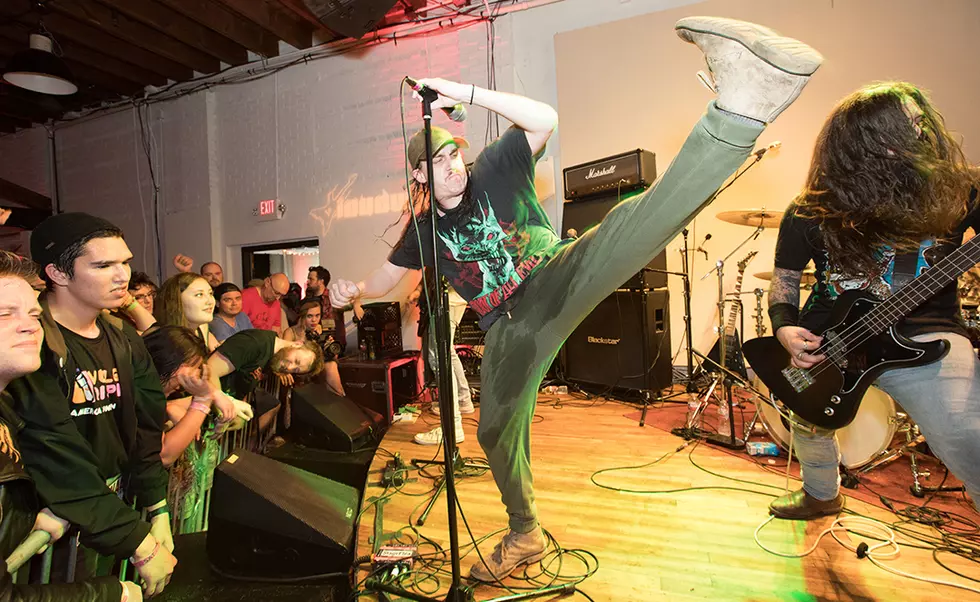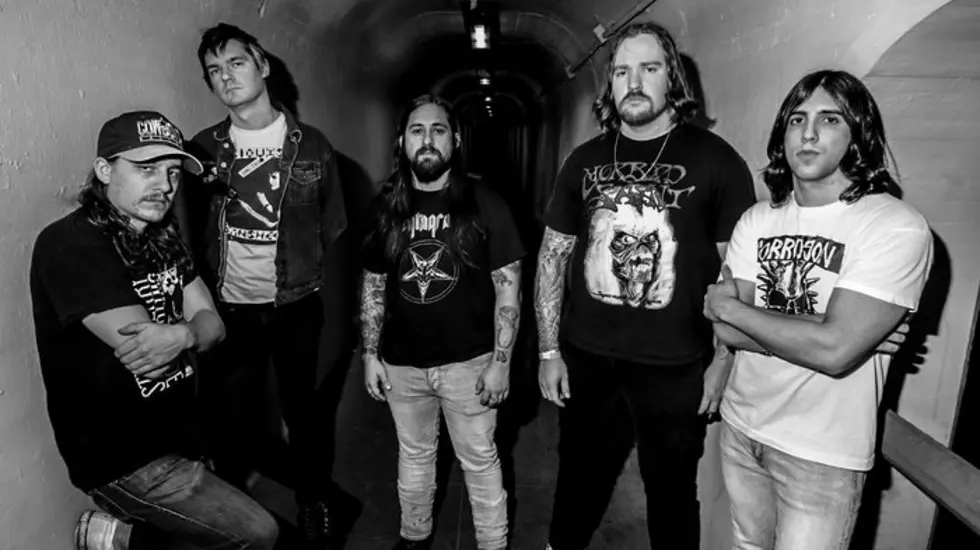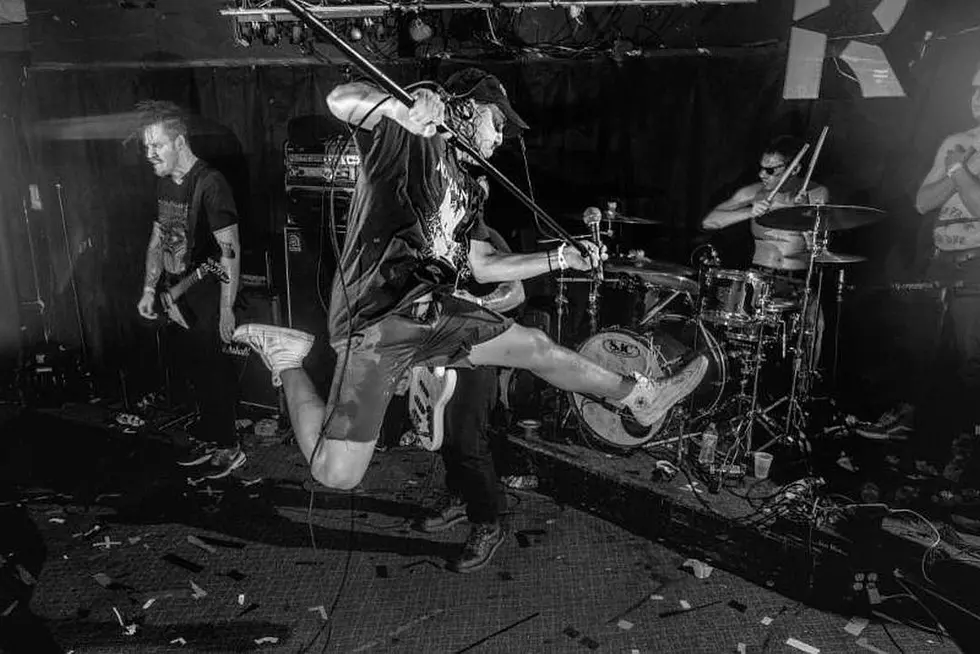
Meet the ‘Nightmare’ Fuel Behind Power Trip
Maybe it’s all of the protesters, or maybe it’s the threat of doing his second in-person interview ever, but Chris Ulsh does not look at ease. Outside of Grizzly Hall in Austin, Texas, a group of about a dozen are standing with signs in hand protesting Marduk, a band that, according to the group, “advocate mass genocide of Jews” (research into the band reveals no such thing). Tempers are running high, and only ramp up further with the arrival of a van packed with Austin police officers. Attention diverted, the voices shift from calling out Nazis to calling out pigs, and we walk into the gig without incident.
Ulsh is here for Incantation and not Marduk, checking out the legendary New York death metal band for the first time ever. Their set is peppered with classics from across their career, including the pivotal Onward to Golgotha era, and by the time they close things down, reality starts to set in that we’ll have to cross the “picket line” again. We wait for Marduk to set up, watch them play for a moment while we gather a plan, and decide that we must leave during their performance of “The Blond Beast,” scoffing at its “black metal disco” approach. As we walk out, it becomes apparent that the protest has ended. Yet again, Ulsh finishes on top. It seems like a theme recently.
If you ever meet the Austin resident, he’ll probably be clad in a leather jacket, slim jeans and boots, Anti-Cimex patch sewn on a hoodie. He’s soft-spoken, but not quiet — more measured in his words and usually quick with a sharp retort. When he’s not on the road, you can usually find him at either his practice space or an outdoor bar with other local artists or bandmates, telling ridiculous inside jokes or speaking in tongues about a record that mostly no one has heard. But to those he knows best, Ulsh is a prankster, known for playing a whole set while listening to Discharge on his headphones. Or in an American flag Lycra suit. Or even with a fan on his floor tom.
Outside of his close friends, he prefers to let his music do the talking, and despite his many projects, doesn’t grant many interviews. In fact, tonight’s interview was spurred more by his love for Incantation and less his enthusiasm for quality journalism (or whatever it is that's contained herein).
Musically, Ulsh is one of a select few “utility players” in punk / hardcore, joining names like Chris Corry, Justin DeTore, Jensen Ward, Connor Donegan or Sam Bosson (the latter two of which also did time in Power Trip) as musicians with a strong breadth of ability and work ethic, who consistently produce quality releases. Longtime collaborator and friend Mike Sharp nails it when asked about Ulsh: “He's one of those rare cases where you could drop him in any band and he figures out what's missing from it, grabs that and blows it out. I've only ever met a handful of guys like that.” D.C. musician and Damaged City Fest honcho Chris Moore agrees, adding, “He's one of those assholes that rips on every instrument, and I can't imagine what Texas would do without him.”
Ulsh currently plays with no less than six bands, including crossover favorites Power Trip, who seem poised for greatness with their new LP, Nightmare Logic. Meanwhile, Vaaska and Impalers are two of the most revered bands in punk today, Mammoth Grinder have a hotly anticipated new LP, and Iron Age are considered cult legends in the realm of hardcore. When it comes to aggressive music, Ulsh has the Midas touch. Beach Impediment honcho and Wasted Time / Aggression Pact frontman Mark Shubert agrees: “I've noticed that Ulsh has been an integral part of some of the bands that have taken Texas hardcore and punk to another level. He's aided in the creation of more memorable and killer 'hardcorepunkmetal' ... in [the eight years that I’ve known him] than most could hope to yield in a lifetime.”
When pressed, Ulsh says that he considers himself a guitarist first. “It’s really funny, because I don’t really play guitar in any bands anymore” he says. “But I still write a lot of things on guitar. I never considered myself that great of a drummer, but six years of heavy touring will make you a lot better.”
Not everyone agrees with Ulsh's self-evaluation as a drummer, but nevertheless prefer some of his other musical personas, including longtime tour manager and NYC promoter Dan Oestreich: "He always looks so calm and collected while drumming that every time I see him with a mic in his hand and doing one of his jumps, or just looking generally unhinged, I'm caught off guard and love it."
All of this started out in a really odd way, and not that far off from Charlie Sheen’s Ricky "Wild Thing" Vaughn character from Major League. During a childhood visit to an Houston Astros game, “they had this relief pitcher named Bill Wagner, whose whole thing was he was a ‘badass.’ He would come out to ‘Enter Sandman’ every time, but instead of jogging to the mound from the outfield, he would walk the whole way. It was the most insane form of intimidation, and I thought it was so cool.” That led to a love of Metallica, thanks to Wagner.
Ulsh’s family was not musical, but music was clearly in his blood from an early age. “When I was a little kid, I always wanted to play drums in a band,” he remembers. “I was in school and would bang on my desk with pens and highlighters, and in fourth grade, my teacher slammed on my desk and said, ‘Get your parents to buy you a drum set. This is so annoying.’” Ulsh’s parents would wait another four years to get him that set, instead opting for guitar and piano lessons, but ultimately caving by age 14.
Being an only child, Ulsh lacked an older brother or figure to push him into the darker realms of music, so MTV and alternative radio were staples. Eventually, a friend pushed him to see Hatred Surge and Insect Warfare at a small record store in early high school, which sent him tumbling toward darker music. “I remember being at the show and thinking to myself, ‘This is what I like now.’ That was huge to me,” Ulsh says. (Eventually, he would like Hatred Surge enough to join the band.) That same friend would also introduce him to Poison Idea, Koro and Mayhem, all formative to the young fan.
Mammoth Grinder is his current death metal project, and the first band he took seriously, forming the band in 2005 with Brian Boeckman. “Obsessed with DIY,” the project was Ulsh’s first taste of heavy touring after scheduling U.S. dates around college breaks. “Those were the most fun tours that I ever went on, because everything was new and we just wanted to come home alive,” he recalls. The band released a few LPs via Relapse and 20 Buck Spin, quietly going into hiatus for a few years while Ulsh focused on Power Trip. He admits that he would tell people “it was dead so they wouldn’t ask me about it.” Mammoth Grinder recorded their new LP for Relapse earlier this year; the release date is undetermined, but expected to be in 2017.
Mammoth Grinder are sheer blunt force trauma, a death metal project that owes more to the gallop of punk within death metal than its technicality. (Ulsh quickly shrugs off technical death metal as “dorm room death metal.”) “Once everything really started moving, I’d say the biggest [influence] was Master, because it’s punk, but it’s death metal.”
Early Entombed is a strong influence, but never aping their elders was more of a concern. “We never wanted to be a worship band, really,” Ulsh says. When pressed about punk and its impact on his metal, he refers back to Discharge and its influence on names like Repulsion and Nihilist in the formation of the basis of the genre.
In 2008, Ulsh would join forces with Alex Hughes, playing on both Hatred Surge and Mammoth Grinder releases and live shows. Eventually, Ulsh would move on to replace Hughes as a member of the now-legendary Iron Age. In many ways, Ulsh saw a kindred spirit in Hughes, particularly in his many bands, musical ability and drive to succeed. Hatred Surge drummer Mike Sharp comments, “I think Ulsh saw how Alex treated music and didn't blink following suit, because they both have the talent to chase whatever they want.” All of a sudden, Ulsh had moved from being a fan of his favorite local bands to joining all but one, and that final accomplishment wouldn’t take long either.
The Texas hardcore scene is a small one. While founding Power Trip member Blake Ibanez was away to college in Arizona, frontman Riley Gale got an offer for a show that he really wanted to play. Gale had booked Mammoth Grinder several times in Dallas, and approached Ulsh to play guitar for the gig. With zero band practices together, Ulsh learned the songs and played the gig. Pretty soon after that, he was added as drummer once his predecessor moved to Chicago. “There wasn’t a lot of planning, and I didn’t expect it, but it happened all of a sudden.”
That said, you might catch him on guitar or drums on any given night, depending on what the band needs. You might even see him as one of three guitar players (the third being producer Arthur Rizk), like during their 2014 appearance with World Burns to Death and Long Knife. “It’s funny because everyone kept on breaking strings, so you never got that actual three guitar effect," Ulsh remembers, "but it was the perfect back-up plan.”
On the eve of the release of their new LP, Nightmare Logic, Ulsh reflects on its predecessor, Manifest Decimation: “We didn’t expect to be touring for three years off of that record. I didn’t play as well as I thought I could, and if we could have, we might have spent more time on it.” The difference in the new LP is clear, exhibited by intense practices with the band twice a day for a week and a half. Demos for were created and everything was laid out before heading into the studio, as opposed to Manifest Decimation where material was being worked out on the way to Arthur Rizk. “Way more cold and calculated," Ulsh stresses. "Everything is planned out, even though it all happened really quickly.”
Nightmare Logic can be seen as the band’s most important statement to date, a signifier of their time to seize the spotlight. “I think there is more pressure on this one, but when we were working on the music, we were way more efficient,” Ulsh notes. “That’s probably a function of us being on the road so much.” With this new album under their belts, Power Trip appear poised to do something great, according to talent bookers like David Castillo of Saint Vitus Bar. "They've toured with big names like Anthrax / Lamb of God, and gone across the country several times," Castillo says. "They've only needed a new record to push them further and further. Nightmare Logic is their most crucial record to make them have a wider impact and push them to become a younger / bigger headliner. It's something that metal could use right now, and the quality of the material is there for them to do it."
Power Trip’s road dog status and versatility are their greatest strengths. Much like heavier bands that have crossed into the indie set, like Fucked Up or Trash Talk, Power Trip are comfortable playing virtually any gig, whether that’s with Tommy Wright III, Benediction or Citizen. “It’s always cool to say, ‘This is the most people I’ve ever played for,’” Ulsh says. “Hellfest or a show or two on the Lamb of God tour might have been our biggest. But we’ll play anything, because the live show will always be the same. I’m just excited to be there. We all put a lot into this record, so we’re going to take the ride.”
Though Power Trip have gone on to more than prove themselves, there's no denying the fact that Iron Age helped pave the way for the band. Ulsh agrees wholeheartedly, and cites his reverence for Iron Age, naming them as “one of his favorite bands” when he moved to Austin. Wade Allison, Jason Tarpey and Hughes’ musical influence was undeniable, either through the band or via Ulsh’s time working at the now-defunct Cyclopean Records. Ulsh admits that the Iron Age appearance at the Power Trip record release show (yes, he will be doing double duty) is not the last we will hear from the band, and that there are definitely “things going on.” When pressed about new music or more live gigs, he’s quick to say that “things happen slowly” with the band, but rules out neither.
With all of these balls in the air, the way Ulsh subdivides the writing for each band is mostly focused on his upcoming projects. “With the Mammoth Grinder record, I wrote that over the course of three to four years,” he says. “It’ll have new versions of the songs that appeared on the 2014 cassette. But the way I write comes in batches; it’s basically whenever I have time to get into a specific headspace. I like to plan it out more and surround myself with the influences for a band. I’ve never written something and wondered, ‘Should I use this riff for this band or this band?’”
A few days after that run-in with the police and protesters, Ulsh is DJing at a local bar. It’s a much mellower scene, filled with friends who are dancing along to his “party songs” of the metal and punk sort. After a Discharge classic, Mercyful Fate’s ripper “A Dangerous Meeting” comes on, and triumphant fists are raised. This may be his first time DJing, but he’s used to playing the hits.
More From CLRVYNT









